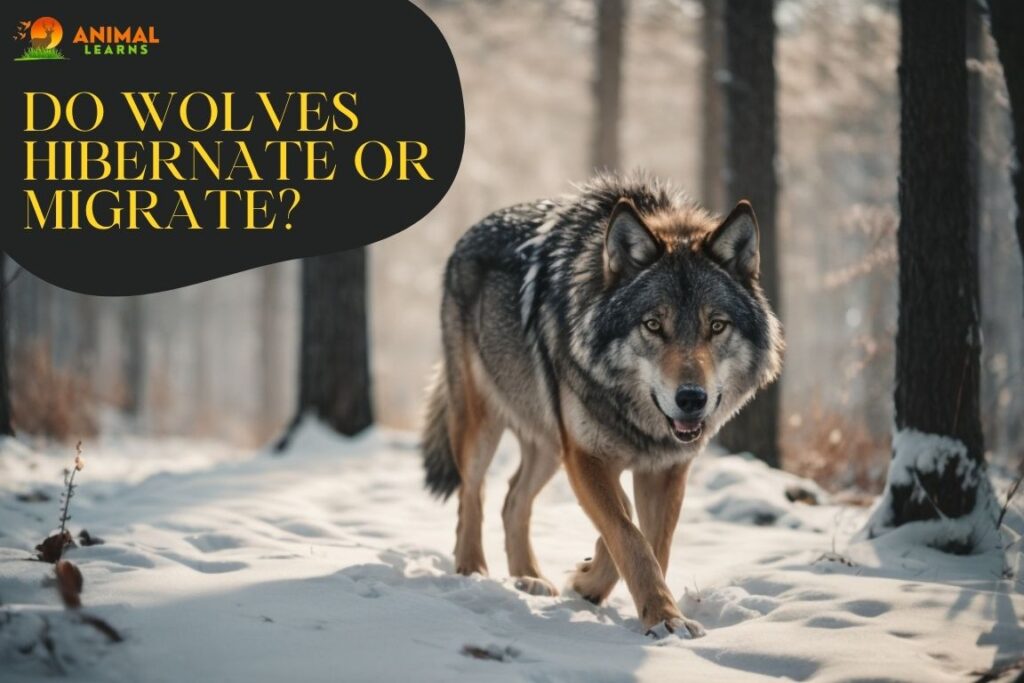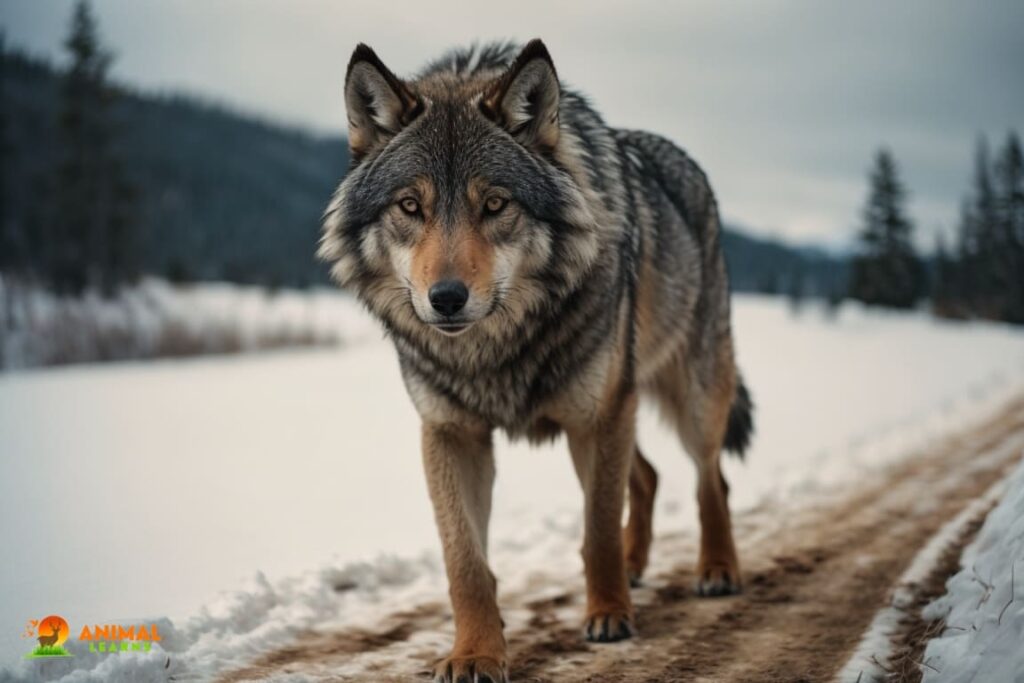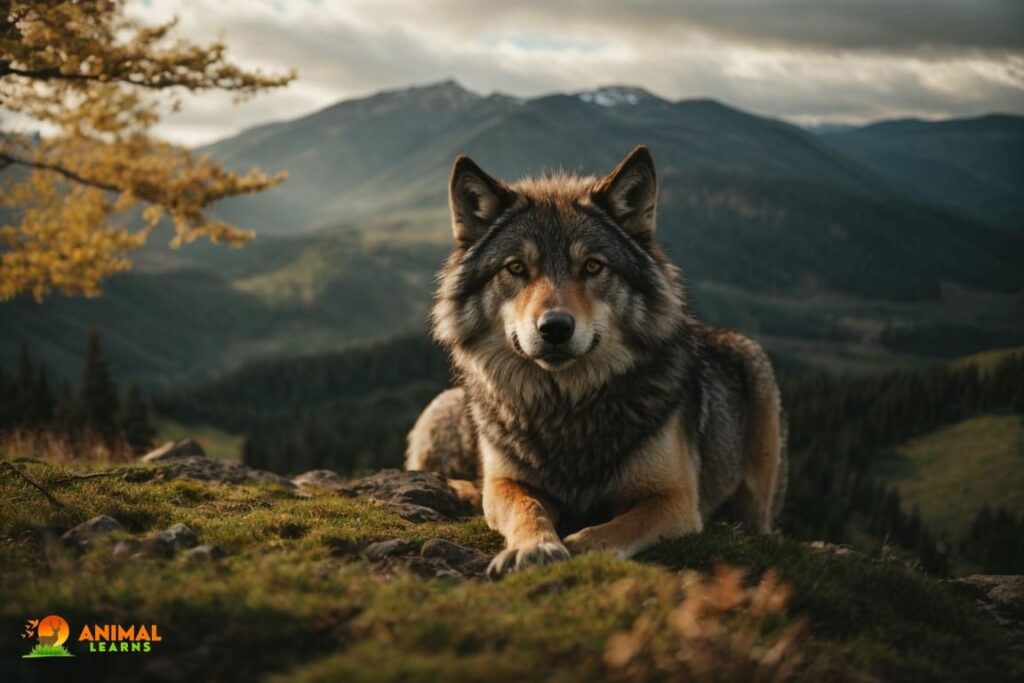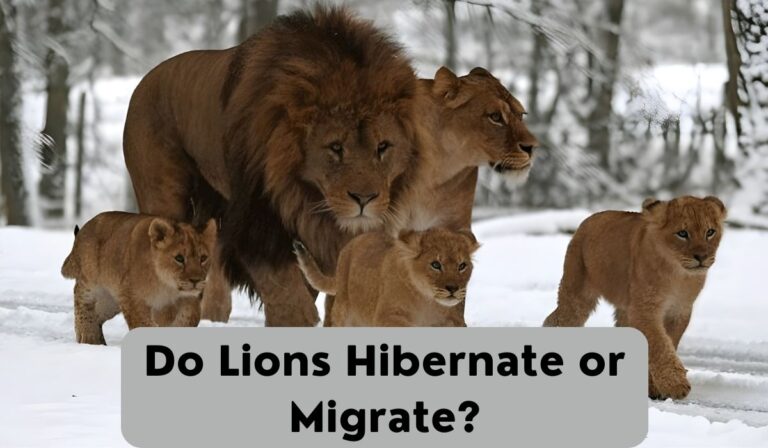Do Wolves Hibernate or Migrate?

How long do wolves hibernate?” is a common inquiry, but the answer is that wolves do not undergo true hibernation. Wolves, renowned for their adaptability, exhibit intriguing variations in their hibernation behaviors.
While some species are known to hibernate during the harsh winter months, the question of “do wolves hibernate in winter” is not universal. In regions with milder winters, such as the temperate forests of North America, the practice of hibernation may be less pronounced.
This contrast in hibernation patterns raises questions about how environmental factors influence these apex predators.
What is Hibernation?
Contents
- 1 What is Hibernation?
- 2 Which Wolf Species Hibernate?
- 3 Seasonal Variations in Wolf Hibernation
- 4 Do Wolves Hibernate in Winter or Summer?
- 5 How Do Wolves Hibernate?
- 6 Initiation of Hibernation:
- 7 Hibernation Duration: How Long Do Wolves Hibernate?
- 8 Why Some Wolves Don’t Hibernate
- 9 Wolf Hibernation Habits Around the World
- 10 Difference Between Wolf And Fox
- 11 What Do Wolves Do in The Winter?
- 12 FAQs
Some animals have invented an incredible survival technique of hibernation, which allows them to withstand extremely cold temperatures and a shortage of food.
An animal enters a condition of inactivity known as hibernation, which causes a dramatic decrease in its body temperature, metabolic rate, and energy consumption overall. Animals may store energy during this dormant phase and go for extended periods of time without eating.
Which Wolf Species Hibernate?
Of the several species of wolves, hibernation only occurs in some subspecies or populations. Gray wolves, for example, are a common and widely researched species that hibernate in some areas. Although they live in such northern latitudes, Arctic wolves may also hibernate in order to survive the bitter cold.
Unfortunately, not all wolf species or populations hibernate, and the choice to do so can be affected by the surrounding conditions as well as the availability of food.
Seasonal Variations in Wolf Hibernation
Seasonal fluctuations affect the hibernation behaviors of wolves. Wolves are more prone to hibernate in areas with severe winters and little food supplies in order to store energy and resist the bitter cold.
This behavior, which fits with their natural adaption to thrive in these harsh conditions, may involve a decrease in activity and mobility during the colder months. In contrast, wolf hibernation could not be as common in areas with warmer conditions and year-round access to food.
Do Wolves Hibernate in Winter or Summer?

Understanding whether or not do wolves hibernate in winter or summer sheds light on their remarkable adaptability to changing environmental conditions. The temperature and availability of prey in the area have a major influence on when wolves hibernate.
During the winter, wolves frequently display hibernating tendencies in areas with severe winters. This calls for less activity and energy saving. However, wolf hibernation may not be as common and activity levels might stay relatively consistent even throughout the colder season in places where winter temperatures are milder and prey is accessible year-round.
Thus, wolves’ choice to hibernate in the summer or the winter depends largely on the biological circumstances and their particular environment.
How Do Wolves Hibernate?
Unlike several other animals, wolves do not hibernate in the conventional sense. Instead, during the hard winter months, they display behavioral modifications and adaptations. I can explain why wolves become less active and preserve energy, especially in colder regions, as a professor with vast understanding of animals.
To boost their chances of surviving, they could roam less, rely more on fat reserves that they have stockpiled, and develop stronger social relationships with their pack. Their ability to withstand the harshness of winter thanks to these behavioral modifications ensures their survival in the wild. It’s an amazing illustration of how nature can adapt and flourish in harsh environments.
In summary, the answer to “How do wolves hibernate” lies in their remarkable ability to stay active year-round, adjusting their behavior to survive challenging conditions
Initiation of Hibernation:
- Seasonal Triggers: Wolves usually respond to seasonal shifts by going into hibernation, especially when the weather cools off and food becomes scarce.
- Reduced activities: As hibernation draws near, wolves progressively cut back on their activities to preserve energy for the next, skinny months.
- Feeding Behavior: In order to store energy in their body fat before to hibernation, wolves frequently eat a lot of food.
- The selection of a shelter: Wolves look for protected areas, such as caves or dens, where they may hibernate somewhat safely.
- Changes in Metabolism: A wolf’s metabolism dramatically slows down once hibernation begins, which helps the animal preserve calories.
Hibernation Duration: How Long Do Wolves Hibernate?
- The length of hibernation ranges from weeks to many months, depending on the wolf species and the area.
- Wolves hibernate for two to three months in the winter, however there are occasional variances.
- Wolf activity during hibernation is restricted to sleeping and the odd trip outside to drink.
- When the weather is right for hunting and foraging, wolves come out of hibernation in the spring.
- Wolf survival depends on hibernating for a long time in order to save energy during the hard winter months when food is in short supply.
Why Some Wolves Don’t Hibernate

A sophisticated viewpoint is necessary to comprehend why certain wolves decide not to hibernate. Numerous variables, like as their geographic location, the availability of prey, the environment, and even the makeup of their social groups, might be blamed for these differences.
Wolf hibernation remains a subject of scientific fascination, with inquiries like “how do wolves hibernate” and “why do wolves not hibernate” driving research efforts. Understanding the physiological and behavioral aspects of wolf hibernation, including “how does wolves hibernate,” helps demystify this intriguing phenomenon.
As we explore the reasons behind why some wolves don’t hibernate, we uncover a complex interplay between species, habitat, and climate. These mysteries not only enhance our knowledge of wolves but also emphasize the role of environment in shaping their unique hibernation behaviors.
Wolf Hibernation Habits Around the World
The ways that wolves hibernate differ throughout the world, demonstrating their incredible flexibility. While longer hibernation is required in the icy Arctic, warmer winters in North America result in less intense hibernation. Because they live in heavily forested areas, Eurasian wolves have special tactics.
The delicate interaction between the environment and the adaptability of these apex predators is highlighted by their geographic variety, which further adds to their appeal to scientists and nature lovers throughout the globe.
Where Do Gray Wolves Hibernate?
“Insights from Various Regions”: Gray wolves, one of the wolf species most thoroughly investigated, present a strong argument for investigating regional differences in hibernation. Gray wolves adjust their hibernation habits to fit the unique ecological niches they occupy throughout wide swaths of North America and densely wooded parts of Eurasia.
By looking at the many locations where gray wolves hibernate, we may learn a great deal about the complex interactions between these iconic carnivores’ environment and hibernation techniques.
Difference Between Wolf And Fox

Members of the Canidae family, wolves and foxes, differ greatly in terms of size, social behavior, preferred habitats, food, and physical characteristics. While foxes are smaller and usually more alone or found in small family groups, wolves are significantly bigger and extremely gregarious creatures living in packs.
Foxes are omnivores, consuming a variety of foods, but wolves are mostly carnivorous and specialize on hunting huge animals. Interestingly, wolves have a straight, bushy tail, but foxes have a bushy tail with a white tip. These differences draw attention to the distinctive qualities of each species as well as the diversity within the Canidae family.
What Do Wolves Do in The Winter?

Wolves use a variety of adaptive behaviors throughout the winter to help them deal with the difficulties of the season. Due to the predictability of the movements of large herbivores like deer and elk in the snow, they may alter their hunting tactics.
Wolves also group together more closely in order to maximize hunting success and share body heat. They can navigate through snowy conditions thanks to the insulation provided by their thick hair and specially designed paw pads. In addition, winter is a season for mating and wooing, which fortifies pack ties.
Even though they might not actually hibernate, wolves’ wintertime behaviors show how resilient they are to the challenges of the season. In the winter, wolves remain active, and the question “Do wolves hibernate?” is often met with the answer that they do not.
FAQs
Do wolves hibernate in winter?
No, wolves don’t hibernate in the same way some animals do. They remain active throughout the winter months.
Do wolves hibernate in summer?
No, wolves do not hibernate in summer either. They maintain their activity year-round.
Do all wolves hibernate?
No, not all wolves hibernate. The hibernation behavior varies among wolf species and is influenced by their habitat and environmental conditions.
Why don’t wolves hibernate?
Wolves have evolved to cope with harsh winter conditions and maintain their activity to hunt and maintain their pack’s social structure.
When do wolves hibernate?
Wolves do not hibernate, but they may experience reduced activity during severe winter weather when hunting becomes more challenging.












